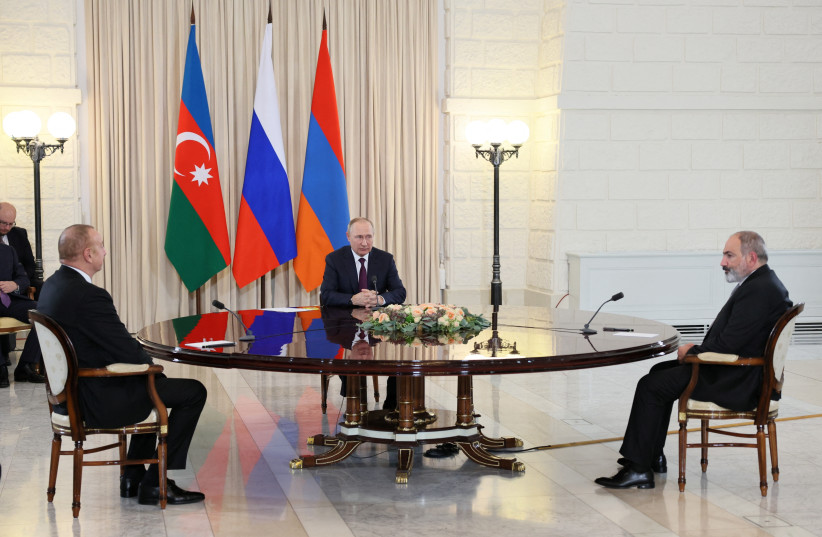Armenia's prime minister expressed concern on Tuesday about the failure of Russian peacekeepers to take a more active role around the disputed region of Nagorno-Karabakh, as Azerbaijan said time was running out for forging a lasting peace deal.
Yerevan wants the Russian peacekeepers to end a month-long Azeri blockade of the only road linking Armenia to Nagorno-Karabakh, a predominantly ethnic Armenian enclave that is internationally recognized as part of Azerbaijan.
"We do not criticize Russian peacekeepers, but we do express concern about their activities, and this concern has long-standing roots," Russian state news agency TASS quoted Armenian Prime Minister Nikol Pashinyan as saying.
Moscow and Yerevan have a mutual defense pact, but Russia also strives for good relations with Armenia's arch-foe Azerbaijan.
The blockade of the road, known as the Lachin corridor, is being led by a group of Azeris identifying themselves as environmental activists.

Armenia says the group comprises agitators backed by the Baku government bent on fueling tensions. Azerbaijan says they are eco-activists protesting against Armenian mining activity and that humanitarian traffic can pass freely along the road.
Both Armenian and Nagorno-Karabakh officials have warned of a humanitarian crisis in the blockaded region.
In December, Armenian news site Hetq quoted Pashinyan as saying that Moscow should make way for an international peacekeeping mission if it is unable to reopen the road.
On Tuesday, Pashinyan said Armenia would not hold drills on its territory in 2023 with the Collective Security Treaty Organisation, a Russian-led alliance of post-Soviet countries.
Asked about the move, Kremlin spokesman Dmitry Peskov played down talk of a rift, saying Armenia was "our very close ally," and that dialog would continue.
Russia's foreign ministry said last month that its peacekeepers - deployed along the contact line in Nagorno-Karabakh and along the Lachin corridor - were doing everything they could to help stabilize the situation in the area.
Border threats
Armenia and Azerbaijan have fought repeatedly over Nagorno-Karabakh, which broke away from Baku's rule after a war in the early 1990s.
In 2020, Azerbaijan retook territory in and around Nagorno-Karabakh in a second war that ended in a Moscow-brokered ceasefire and the deployment of Russian troops to the Lachin corridor.
Last September Azerbaijan staged large-scale cross-border attacks inside Armenia that Yerevan described as unprovoked aggression. Azerbaijan said its soldiers were responding after Armenian sabotage units tried to mine its positions.
Azeri President Ilham Aliyev said in a televised national address on Tuesday that Armenia would be the loser if the sides failed to strike a peace accord this year.
"We can live like this for a long time ... They (Armenia) don't want (border) delineation, which means the border will pass where we deem it necessary," he said, noting that the Russian peacekeepers' mandate expired in 2025.
